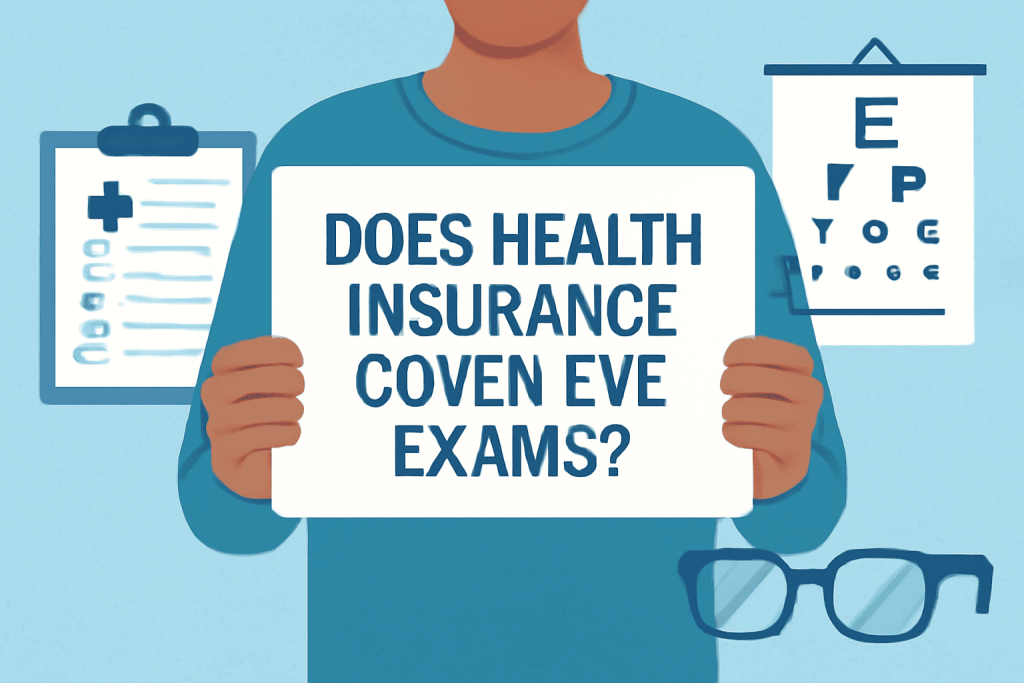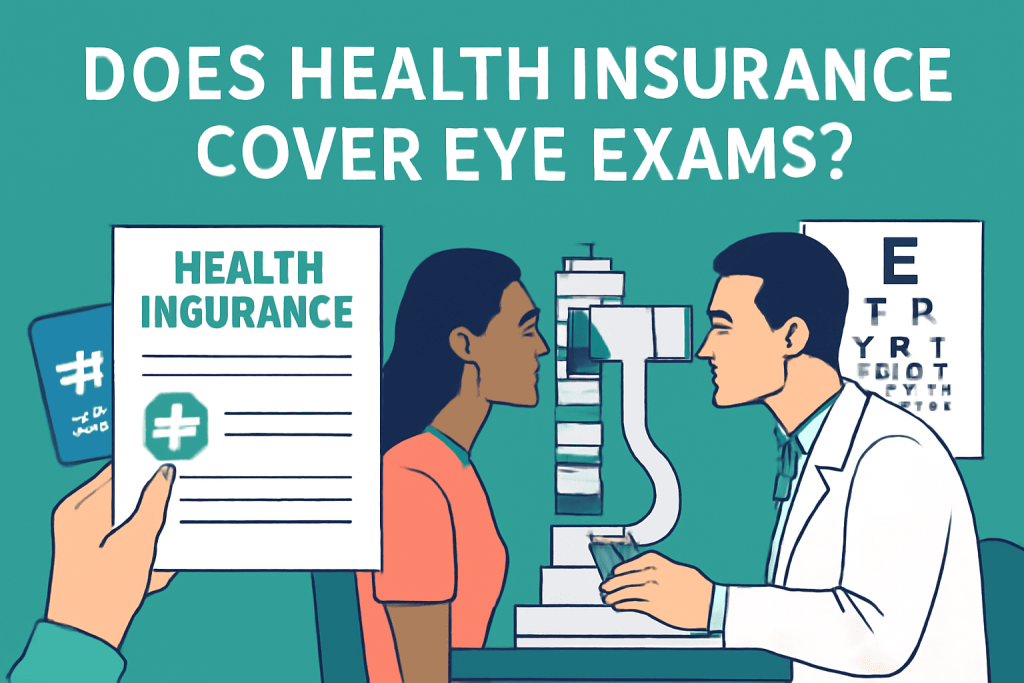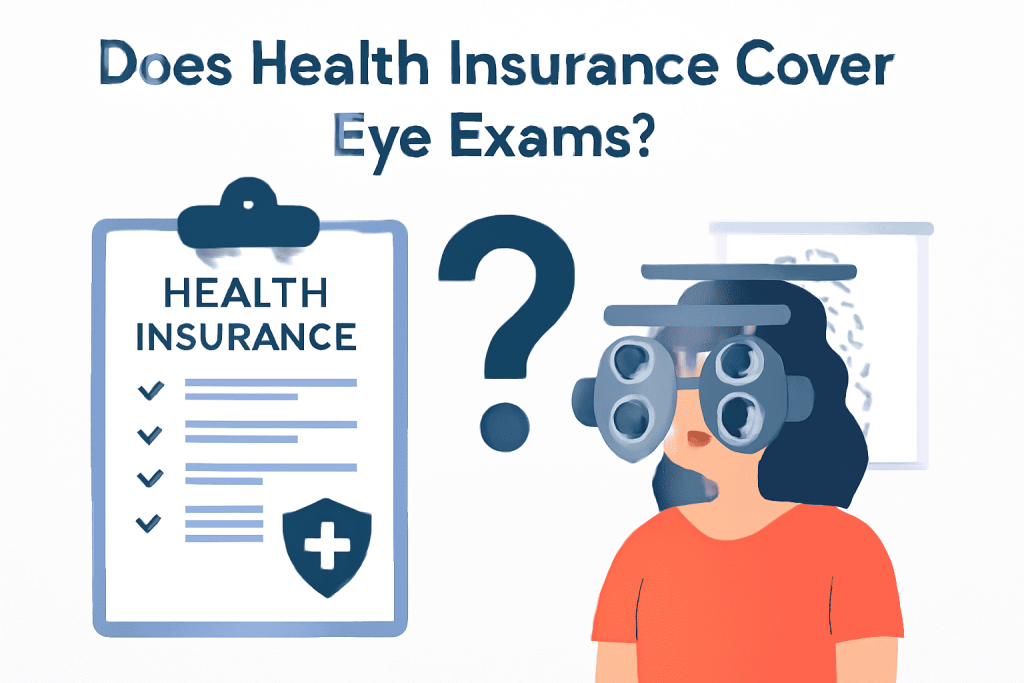We often focus on regular checkups , dental visits , or even fitness routines when it comes to taking care of your health . But one area that people may forget is eye health . Our eyes play such an important role in our life such as reading , driving , working on the screens and even looking around us : yet many of us only visit an eye doctor when something feels wrong . This also leads to an important question which is does health insurance cover eye exams ?
The answer isn’t always straightforward because it sometimes depends on the type of health insurance plan you have . Let’s break it down step by step so you actually understand this in easy language and you understand exactly what is covered when it comes to your eyes .

Understanding the basics of health insurance
Before we cover the topic , whether health insurance covers eye exams or not , let us first understand how health insurance works in general .
Health insurance is designed to protect you from the high medical costs . Usually , it covers hospital visits, doctor’s consultation , surgeries ,lab tests and prescription medicines . However, not all the insurance plans are the same . Some offer very basic coverage ,while others include additional benefits such as dental , maternity and also vision care . The key to know what’s included in your policy . Many people assume that because they have health insurance every medical expense -including eye-exam will be covered. Unfortunately,that’s not always the case . Hope this helps you know does health insurance cover eye exams ?
The difference between health insurance and vision insurance
Here is where most people get confused . Health insurance and vision insurance are not the same things .
- Health insurance mostly focuses on medical treatment -diseases , injuries,surgeries,and hospitalizations.
- Vision insurance focuses on routine eye care – eye exams ,eye glasses, contact lenses,and sometimes discounts on corrective surgeries like LASIK.
If you want your eye routine exams and eye wear to be covered , you will likely need to add a vision insurance plan or choose a health plan that includes vision benefits .
So, when asking does health insurance cover eye exams ,the real answer is : it depends on the reason for the exams . Medical reasons are often covered , but the routine vision checks are usually not .
Why routine eye exams are still important
Even if your health insurance does not cover eye exams , it is important not to skip them . Eye exams can reveal more than just changes in your prescription – they can also help detect early signs of diseases such as
- Diabeties
- Glaucoma
- High blood pressure
- Macular degeneration
Your eye doctor can often notice signs of these conditions before symptoms even appear . That’s why regular check ups are essential, especially if you work long hours on digital screens or have a family history of eye problems .
So if you have the question that does health insurance cover eye exams then know that even if health insurance doesn’t cover your eye exams , it’s still worth investing in one every year or two .

How to check does health insurance cover eye exams?
Since every insurance plan is different, it is best to confirm directly with your insurance provider. Here are a few simple steps to find out –
- Read your policy document carefully .
- Call your insurance company’s helpline .
- Check if you have vision add-ons .
- Ask your doctor’s office .
By checking these details , you can avoid unexpected bills later .
What to do if your health insurance doesn’t cover eye exams
If you are finding out that your plan does not include vision coverage , don’t worry -there are still affordable options .
- But a separate vision insurance plan. Companies like VSP , eyemed , and others offer plans starting at a low monthly cost .
- Use employer benefits . Many workplaces include vision care as part of employees benefits .
- Look for package deals . Some optional stores or clients offer discounted rates on exams and glasses .
- Use health saving account or flexible spending accounts . You can use these funds to pay for eye exams , glasses , or contact lenses even if you health insurance does not cover them .
These small steps can help you take care of your vision without breaking your budget . Hope this helps you understand does health insurance cover eye exams?
Common misconceptions about health insurance and eye exams
Let’s see the few common myths that people often believe :
- All health insurance plans cover eye exams
- Vision insurance and health insurance are the same
- Eye exams are only needed if you have vision problems .
Facts
- Only medically necessary eye exams are usually covered . Routine exams are not.
- Vision insurance is a separate plan that focuses on routine eye care and eyewear .
- Regular exams can detect other health issues early , even before you notice symptoms.
So , the next time you wonder does health insurance cover eye exams eye exams , remember that it depends on your policy and the reason for your visit .
The bottom line: Does health insurance cover eye exams ?
To sum it up :
- Routine eye exams are usually not covered by regular health insurance.
- Medical eye exams are often covered
- Children’s eye exams may be included in family health plans as a part of preventive care .
- To get full coverage for eyes care , you may need a separate vision insurance plan .
In short , when you ask does health insurance cover eye exams the answer is sometimes yes, sometimes no – it depends on the reason and your policy .

Final thoughts
Your eyes deserve the same care as the rest of your body . Whether or not your health insurance covers eye exams , make sure you schedule them regularly. It is a small step that can make a big difference to your quality of life . And if your plan does not include vision benefits , consider adding a vision plan – it is often affordable and ensures that your eyes get the care they deserve . Hope this blog helps you understand does health insurance cover eye exams in easy language and if you wish to explore more click on the Blog Gyan .
Thank you for your Time.


